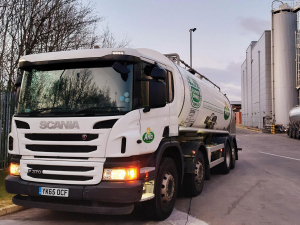$8 milk price this season 'out of reach'
An $8/kgMS farmgate milk price for this season may be out of reach, according to ASB economist Nathaniel Keall.
 Milk price paid to Arla’s farmer suppliers will be linked to environmental sustainability from next year.
Milk price paid to Arla’s farmer suppliers will be linked to environmental sustainability from next year.
European dairy co-operative Arla says, from next year, the milk price paid to farmer suppliers will be linked to environmental sustainability.
Two years after implementing a comprehensive 'Climate Check' on 8,000 farms across seven European countries, Arla farmers are taking another significant step to be at the forefront of environmentally sustainable dairy, the co-op says.
Arla is introducing a point-based Sustainability Incentive model, building on data from the Climate Check, to reward current and future sustainability activities on farm.
Arla directors are putting 3 eurocent/kg of milk on the table annually to fund and motivate environmental improvements on 19 levers. The full incentive package includes the one eurocent that farmers will receive for submitting their Climate Check data. In the first full year, at least 270 million euro is expected to be distributed through the monthly milk price based on what the farmers are doing on 19 levers in the model.
Arla chairman Jan Toft Nørgaard says the Sustainability Incentive model is a historical milestone in Arla's transition to more sustainable dairy.
"We are introducing an advanced and ambitious sustainability incentive, which is a fundamental change to our milk price model.
"Going forward, the milk price Arla farmers will receive for their milk will not only depend on fat, protein and quality, it will also depend on their activities on sustainability.
"The support from our members, even in a time of great uncertainty, is a testament to our commitment to be at the forefront of progressive dairy farming and set the standard for how to push our whole sector forward."
The three eurocent comes on top of the one eurocent that farmers receive for submitting their Climate Check data, which is a pre-condition and the foundation for calculating the individual farmer's incentive.
Based on Arla's current owner milk volume, the four eurocents per kilo of milk amounts to an annual 500 million euro that Arla's board of directors are willing to take from Arla's milk price and re-distribute to that farmers based on their individual points in the Sustainability Incentive model.
With the current milk price, it corresponds to about 7% of the milk price, the co-op says.
Arla chief executive Peder Tuborgh believes the Sustainability Incentive will be an effective tool for driving further improvements.
“Arla has some of the most climate-efficient farmers in the world, however, they also recognise that they need to accelerate their efforts to be at the forefront of environmentally sustainable dairy.
“With this historical step, we will stand stronger in the market and send a clear message to our customers and consumers that the necessary change comes at a price for our owners and that a fair amount of the money you pay for Arla products is directed to the farmers who take the most action.”
The model is a point-based system, in which the farmers can collect points based on their activities on the model’s 19 different levers like feed, protein and fertiliser efficiency, manure delivery to biogas, biodiversity, carbon farming and use of renewable electricity and deforestation free soy.
Eighty points will be available from the start in 2023 and a further 20 points for new levers are expected to be built into the model within a few years, leading to a total of 100 points. For each point that the farmers are able to achieve, they will receive 0.03 eurocent per kilo of milk. Activities with bigger improvement potential for climate and nature will lead to the most points – and therefore also the biggest financial incentive.
The country’s 4200 commercial fruit and vegetable growers will vote from May 14 on a new HortNZ levy.
Meat processor Alliance Group is asking farmer shareholders to inject more capital in order to remain a 100% co-operative.
A vet is calling for all animals to be vaccinated against a new strain of leptospirosis (lepto) discovered on New Zealand dairy farms in recent years.
Dairy
Rural banker Rabobank is partnering with Food Rescue Kitchen on a new TV series which airs this weekend that aims to shine a light on the real and growing issues of food waste, food poverty and social isolation in New Zealand.
Telco infrastructure provider Chorus says that it believes all Kiwis – particularly those in the rural areas – need access to high-speed, reliable broadband.
OPINION: Talking about plant-based food: “Chicken-free chicken” start-up Sunfed has had its valuation slashed to zero by major investor Blackbird…
OPINION: Synlait's financial woes won’t be going away anytime soon.